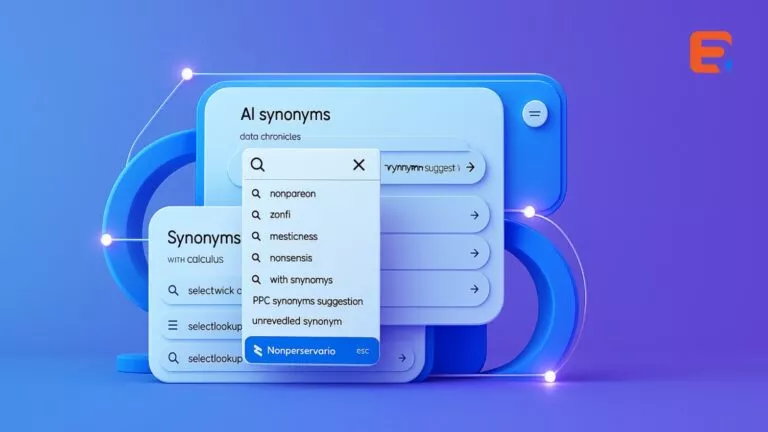What Is an AI Synonym Search Engine?
At its core, an AI synonym search engine is built to understand not just what your users say—but what they mean.
Unlike traditional search engines that rely on exact keyword matching, AI synonym engines use:
- Natural Language Processing (NLP)
- Machine Learning (ML)
- Semantic Understanding
…to expand queries with relevant synonyms, handle language variations, and interpret intent in real time.
Example:
Search for “hoodie,” and users also get results for:
- Sweatshirt
- Pullover
- Zippered fleece
- Jumper (UK region)
This intelligent expansion ensures users don’t hit a dead end—even when they don’t know your product’s “official” name.
Why Is This Important for E-commerce, SaaS, and Content-Heavy Sites?
1. Language Is Messy
People search with different terms for the same thing. AI synonym search reduces “no result” frustrations.
2. You Speak One Language. Users Speak 100.
Across geographies, niches, and buyer personas, terminology shifts. AI synonym search dynamically adapts to this diversity.
3. Intent > Keyword
Someone searching “affordable DSLR” isn’t looking for the exact phrase. They want budget-friendly cameras—AI makes that connection.
4. SEO + UX Superpower
More relevant search results → Better engagement → Lower bounce rate → Higher conversions → Stronger SEO signals.
How It Works: Under the Hood of AI Synonym Matching
| Layer | Technology | What It Does |
|---|---|---|
| NLP Engine | Tokenization, Lemmatization, POS tagging | Breaks user input into meaningful chunks |
| ML Models | Relevance learning, click prediction | Learns from what users click on vs. ignore |
| Synonym Graphs | Domain-based lexicons | Expands queries based on vertical-specific synonym maps |
| Vector Embeddings | Semantic understanding | Understands words in context, not isolation |
Bonus: These systems are self-improving. The more traffic and clicks, the sharper and more intuitive the engine becomes.
Use Cases Across Industries
E-Commerce:
- “Jeans” → “Denims”, “Trousers”, “Skinny fit”
- Reduce bounce rate from irrelevant results
- Recover sales lost to vague or inconsistent terms
Content Platforms:
- “Mental health” → “Anxiety”, “Therapy”, “Mindfulness”
- Drives deeper engagement via content discovery
SaaS Search:
- “Account billing issue” → “Invoice problem”, “Subscription help”
- Enhances customer self-service success
Want your users to always find what they mean—not just what they type?
ry Expertrec’s AI Synonym Search Engine →
Why Expertrec Is the Smartest AI Synonym Search Engine in the Market
Here’s where Expertrec shines—by marrying intelligent synonym expansion with real-world usability, speed, and scalability.
Key Features of Expertrec’s AI Synonym Search Engine
1. Synonym Recognition and Expansion
- Auto-detects synonyms based on user behavior, not static lists
- Allows for manual injection of business-specific synonyms
- Cross-language support for multilingual synonym handling
2. Lightning-Fast Performance
- Sub-50ms response times
- Caches frequently searched patterns with expanded queries
- Designed for high-traffic storefronts and content platforms
3. Intent-Based Relevance
- Learns what users mean—not just what they type
- Avoids keyword stuffing and overfiltering
- Semantic ranking to bring the most meaningful results to the top
4. Autocomplete with Synonym Suggestions
- Starts suggesting meaningful terms mid-typing
- Can show synonyms as dropdown items with images
- Great for visual product searches like fashion, electronics
5. Plug & Play Integration
- Shopify, BigCommerce, Magento, WordPress (WooCommerce)
- React, Angular, and plain HTML/JS support
- 1-line JavaScript or API-based integration
6. A/B Testing + Search Analytics
- Compare AI synonym performance vs. keyword-only
- See query rewrites, CTR improvement, bounce rate drops
- Data-driven insights into user behavior
7. No-Code Control Panel
- Add, modify, and prioritize synonyms manually
- Train AI on new product catalogs instantly
- Set up vertical-specific synonym rules
Final Thoughts
Search is no longer about just matching words—it’s about matching meaning.
If your site’s search isn’t smart enough to know that “formal shoes” and “dress shoes” are the same thing, you’re losing users (and revenue) fast.
Expertrec makes AI synonym search:
- Scalable
- Smart
- Super easy to integrate
Upgrade your search from robotic to razor-sharp.
Book a Demo with Expertrec Today
Frequently Asked Questions
Q1: What’s the difference between AI search and traditional keyword search?
A traditional search engine matches exact terms. AI search understands meaning, relationships, and context—making it more flexible and accurate.
Q2: Can synonym engines handle regional differences like “trainers” vs. “sneakers”?
Yes. Expertrec’s AI models adapt to local language preferences based on location, history, and behavior.
Q3: Is AI synonym search better for SEO or UX?
Both. Improved UX increases on-site engagement, which sends strong SEO signals to search engines.
Q4: Do I need a developer to implement Expertrec?
Not necessarily. Expertrec offers one-line install snippets, and for advanced setups, API access and SDKs are available.
Q5: Can I teach it custom synonyms (e.g., “glam wear” = “evening dresses”)?
Absolutely. You can add, prioritize, and control synonyms through the dashboard.




